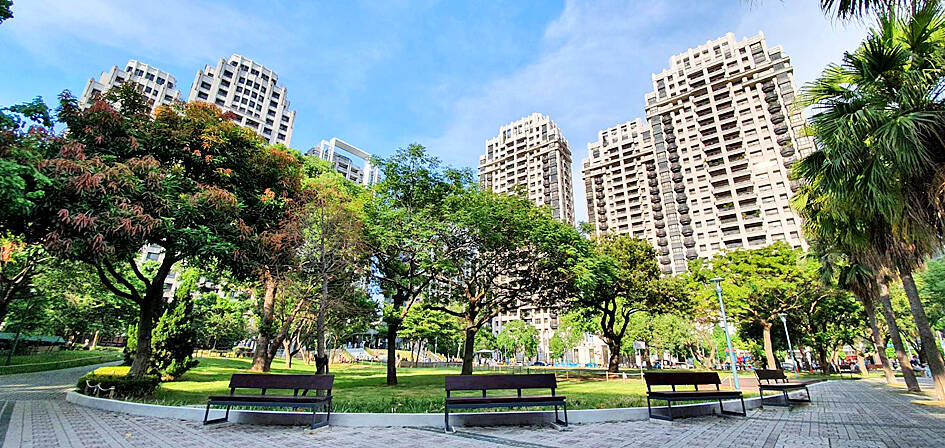Hsinchu City’s Guanxin Borough (關新) again recorded the highest average annual household income among the nation’s boroughs in 2022, income tax data released yesterday by the Ministry of Finance showed.
The average annual household income in Guanxin was NT$4.611 million (US$142,096), topping all other boroughs or villages in Taiwan for the fifth consecutive year, the ministry-compiled data showed.
That figure rose 23 percent from NT$3.747 million in 2021.

Photo: Tsai Chang-sheng, Taipei Times
Guanxin, in the city’s East District (東區), is home to many technology professionals who work in the nearby Hsinchu Science Park (新竹科學園區), which houses more than 500 tech companies.
The median annual household income in Guanxin was NT$3.543 million, indicating that the borough was not only the richest of its kind, but its household income was also evenly distributed, compared with its peers.
Datong Borough (大同) in Hsinchu City’s North District (北區) was the second-richest borough in 2022, with an average annual income of NT$3.887 million.
However, its median income was only NT$726,000, suggesting a large wealth gap among its residents.
The third-richest borough or village was Jhongsin Borough (中興) in Hsinchu County’s Jhubei City (竹北), with an average annual income of NT$3.475 million and a median income of NT$1.979 million, ministry data showed.
Yongfu Borough (永福) in Taipei’s Shilin District (士林) was the fourth-richest borough, with an average annual income of NT$3.425 million and a median income of NT$738,000.
On Yangde Boulevard (仰德大道) in the Yangmingshan area, Yongfu was the only borough in Taipei to make the top five richest boroughs in 2022, although it fell two notches from the previous year, data showed.
Tongping Borough (東平), also in Hsinchu County’s Jhubei, was the fifth-richest borough with an average annual income of NT$3.36 million and a median income of NT$2.406 million.
The ministry’s data, which cover about 6.63 million households, showed that Hsinchu City topped the list of wealthiest cities in 2022 with an average annual household income of NT$1.505 million.
Hsinchu County ranked second with NT$1.34 million, followed by Taipei with NT$1.257 million, while the average annual household income in the other five special municipalities was between NT$790,000 and NT$850,000, the data showed.
Hsinchu City also ranked first for the average household wage, with NT$1.19 million, ahead of Hsinchu County with NT$1.08 million and Taipei with NT$850,000, while the other five special municipalities’ average household wages were between NT$540,000 and NT$630,000.
Meanwhile, Taipei topped other cities and counties in terms of dividend income, with NT$446,000 per household on average in 2022, followed by Hsinchu City with NT$292,000, the ministry’s data showed.
The dividend income per household in 20 other cities and counties was lower than the national average of NT$179,000.

A magnitude 5.6 earthquake struck off the coast of Yilan County at 12:37pm today, with clear shaking felt across much of northern Taiwan. There were no immediate reports of damage. The epicenter of the quake was 16.9km east-southeast of Yilan County Hall offshore at a depth of 66.8km, Central Weather Administration (CWA) data showed. The maximum intensity registered at a 4 in Yilan County’s Nanao Township (南澳) on Taiwan’s seven-tier scale. Other parts of Yilan, as well as certain areas of Hualien County, Taipei, New Taipei City, Taoyuan, Hsinchu County, Taichung and Miaoli County, recorded intensities of 3. Residents of Yilan County and Taipei received

TRUST: The KMT said it respected the US’ timing and considerations, and hoped it would continue to honor its commitments to helping Taiwan bolster its defenses and deterrence US President Donald Trump is delaying a multibillion-dollar arms sale to Taiwan to ensure his visit to Beijing is successful, a New York Times report said. The weapons sales package has stalled in the US Department of State, the report said, citing US officials it did not identify. The White House has told agencies not to push forward ahead of Trump’s meeting with Chinese President Xi Jinping (習近平), it said. The two last month held a phone call to discuss trade and geopolitical flashpoints ahead of the summit. Xi raised the Taiwan issue and urged the US to handle arms sales to

Taiwan has secured another breakthrough in fruit exports, with jujubes, dragon fruit and lychees approved for shipment to the EU, the Ministry of Agriculture said yesterday. The Animal and Plant Health Inspection Agency on Thursday received formal notification of the approval from the EU, the ministry said, adding that the decision was expected to expand Taiwanese fruit producers’ access to high-end European markets. Taiwan exported 126 tonnes of lychees last year, valued at US$1.48 million, with Japan accounting for 102 tonnes. Other export destinations included New Zealand, Hong Kong, the US and Australia, ministry data showed. Jujube exports totaled 103 tonnes, valued at

BIG SPENDERS: Foreign investors bought the most Taiwan equities since 2005, signaling confidence that an AI boom would continue to benefit chipmakers Taiwan Semiconductor Manufacturing Co’s (TSMC, 台積電) market capitalization swelled to US$2 trillion for the first time following a 4.25 percent rally in its American depositary receipts (ADR) overnight, putting the world’s biggest contract chipmaker sixth on the list of the world’s biggest companies by market capitalization, just behind Amazon.com Inc. The site CompaniesMarketcap.com ranked TSMC ahead of Saudi Aramco and Meta Platforms Inc. The Taiwanese company’s ADRs on Tuesday surged to US$385.75 on the New York Stock Exchange, as strong demand for artificial intelligence (AI) applications led to chip supply constraints and boost revenue growth to record-breaking levels. Each TSMC ADR represents